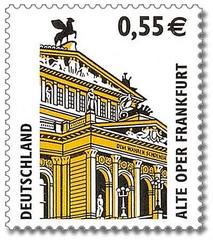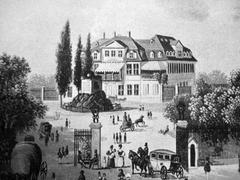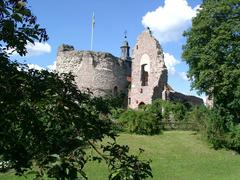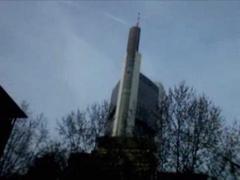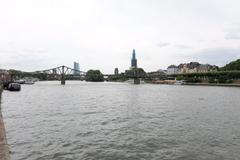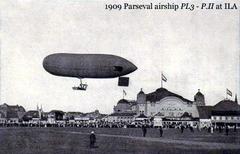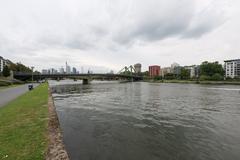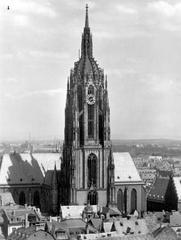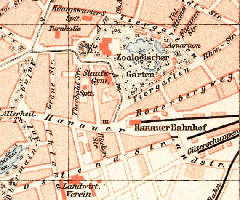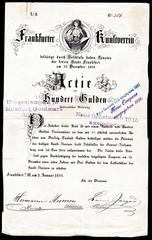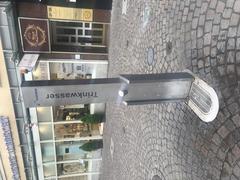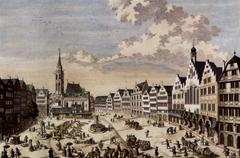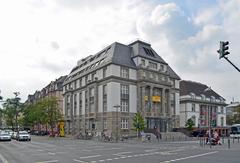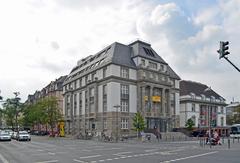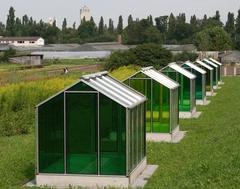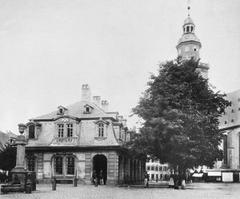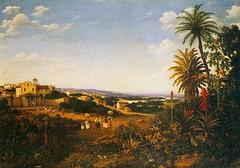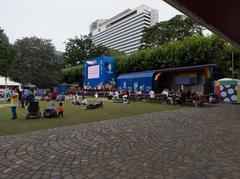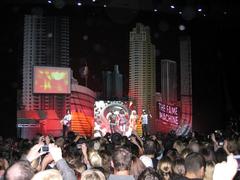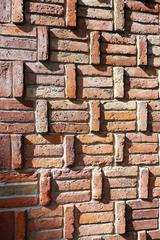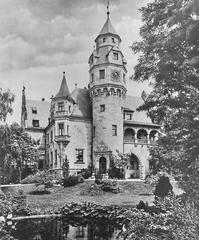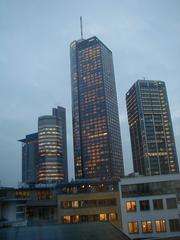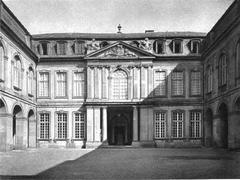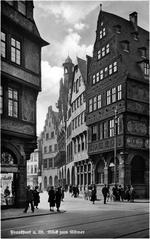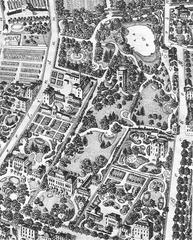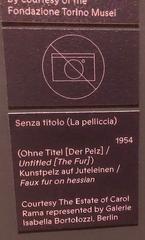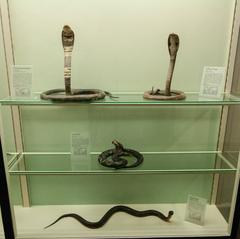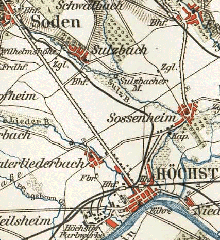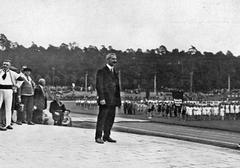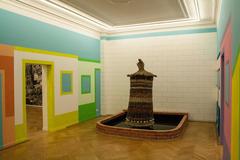German Exile Archive Frankfurt: Visiting Hours, Tickets, and Historical Information
Date: 03/07/2025
Introduction
The German Exile Archive 1933–1945, located within the German National Library in Frankfurt am Main, stands as a cornerstone for understanding the experiences of German-speaking exiles during the Nazi era. As both a research institution and a memorial, the archive preserves personal stories, literary works, and cultural artifacts from those who fled persecution between 1933 and 1945. Its collections, educational programs, and exhibitions offer invaluable resources for researchers, students, and the general public. This guide provides comprehensive information on visiting hours, ticketing, accessibility, exhibitions, and travel tips, as well as contextual insight into the archive’s historical significance and ongoing mission.
Historical Background and Institutional Development
Founding Origins
Established in 1948, the German Exile Archive 1933–1945 was founded by exiles and their supporters, including members of the Schutzverband Deutscher Schriftsteller in der Schweiz and the first director of the Deutsche Bibliothek Frankfurt, Hanns Wilhelm Eppelsheimer. Their mission was to safeguard the literary and personal testimonies of those displaced by the Nazi regime, ensuring that the exilic experience would not be forgotten (DNB History).
Growth and Transformation
Over the decades, the archive expanded its holdings to include personal estates, periodicals, unpublished manuscripts, and visual materials. The reunification of Germany in 1990 fostered collaboration between the Frankfurt and Leipzig sites, further professionalizing the archive’s services and enhancing accessibility (DNB History).
Digital Era and Innovation
In the 21st century, the archive has embraced digitalization, offering virtual exhibitions and online access to its collections. The permanent exhibition “Exil. Erfahrung und Zeugnis” (Exile. Experience and Testimony) launched in 2017, introduces immersive storytelling techniques and interactive digital interviews, connecting visitors to eyewitness accounts (DEA Node).
Collections and Exhibitions
Scope of the Archive
The German Exile Archive documents a broad range of exile experiences, with collections that include:
- Books and Brochures: Approximately 19,000 items, many published in exile.
- Periodicals: About 13,000 volumes from 1,200 periodical titles, covering exile newspapers and magazines.
- Archival Materials: 307 personal and institutional estates, 860 thematic archival collections, and extensive correspondence.
- Special Holdings: Manuscripts, 1,770 leaflets, and digitized materials accessible on-site (DNB: About the Archive).
Permanent Exhibition: “Exile. Experience and Testimony”
This core exhibition is structured around themes of “Escape, Exile, and Return,” presenting original documents, photographs, biographical stories, and artifacts. The exhibition incorporates country profiles and a glossary of notable exiles to provide context (German Studies Collaboratory).
Digital Interactive Interviews: “Just Ask!”
A highlight of the archive is the “Just Ask!” interactive installation, featuring digital interviews with Holocaust survivors Inge Auerbacher and Kurt S. Maier. Visitors can ask questions, receiving pre-recorded video responses that foster a dynamic connection with survivor testimonies (fragnach.org; Springer).
Temporary and Thematic Exhibitions
The archive frequently hosts temporary exhibitions exploring specific facets of exile history, literature, and culture. These often feature collaborations with contemporary artists and scholars, and are accompanied by educational materials and public events (German National Library’s website).
Visitor Information
Location and Contact
- Address: Adickesallee 1, 60322 Frankfurt am Main, Germany
- Phone: +49 (0)69 1525-0
- Website: German Exile Archive
- Email for Appointments: [email protected]
Visiting Hours
- Exhibitions: Monday to Friday, 10:00 – 18:00
- Digital Interactive Interviews “Just Ask!”: Monday to Friday during opening hours
- Saturday/Sunday: Closed (verify for exceptions and special events)
- Note: Always check the official website for current information and holiday hours.
Admission and Tickets
- Admission: Free of charge
- Guided Tours: Available by advance booking. Some special events or workshops may carry a fee.
Accessibility
- The building is fully accessible, offering step-free entry, elevators, and accessible restrooms.
- Assistance for visitors with disabilities can be arranged upon request (DNB: Visitor Information).
Guided Tours and Educational Programs
- Regular guided tours (in German and English) provide deep insights into the exhibitions.
- Educational workshops for schools and universities are available, focusing on exile history and memory.
- Group tours require advance booking.
Facilities
- Reading Room: Appointment recommended. Access to archival materials and digital resources provided.
- Lockers and Café: Available on site.
- Photography: Permitted without flash, with some restrictions for sensitive items.
Digital and Online Access
- Extensive digitized collections and virtual exhibitions are available on-site at computer workstations and through the German National Library’s catalogue (DNB Catalogue).
- Online exhibitions and learning modules, including “Exile. Experience and Testimony,” are accessible for remote exploration (fragnach.org).
Nearby Attractions and Travel Tips
While visiting the German Exile Archive, explore these nearby Frankfurt highlights:
- Goethe House: Birthplace of Germany’s most famous writer.
- Städel Museum: World-class art collections.
- Frankfurt Old Town (Alt-Sachsenhausen): Historic streets, cafes, and architecture.
- Jewish Museum Frankfurt: Explores Jewish life and history in the city.
Travel Tips:
- Easily accessible by public transit (tram and subway stops nearby).
- Frankfurt Central Station is about 15 minutes away by tram.
- Parking is limited; public transportation is recommended.
Cultural and Educational Programs
- Workshops: Explore migration, memory, and ethical responsibilities using original documents and digital resources.
- Public Events: Regular lectures, readings, and panel discussions are offered, especially during commemorative periods.
- School Programs: Interactive tours and digital modules cater to young visitors and educators.
COVID-19 and Safety
As of June 2024, most restrictions have been lifted, but check the official website for updates on health protocols and group visit arrangements.
Frequently Asked Questions (FAQ)
Q: What are the archive’s opening hours?
A: Monday to Friday, 10:00 – 18:00. Closed on weekends and public holidays.
Q: Is there an admission fee?
A: No, entry is free.
Q: Are guided tours available?
A: Yes, by advance booking in German or English.
Q: Is the building accessible?
A: Yes, with step-free entry, elevators, and accessible restrooms.
Q: How do I access archival materials?
A: Contact [email protected] to schedule a reading room appointment.
Q: Can I take photographs?
A: Non-flash photography is generally allowed except for restricted items.
Q: Are digital resources available remotely?
A: Many are, via the DNB online catalogue and fragnach.org.
Conclusion and Recommendations
The German Exile Archive 1933–1945 is an indispensable resource for those seeking to understand the individual and collective stories of exile under the Nazi regime. Through its extensive collections, innovative digital programs, and commitment to education and remembrance, the archive not only preserves history but actively shapes contemporary discourse on migration, memory, and human rights.
Plan your visit by consulting the official website for the latest on opening hours, events, and educational programs. Consider combining your archive visit with other cultural highlights in Frankfurt for a deeply enriching experience. For digital engagement, explore the archive’s virtual resources and follow on social media for news and updates.
Sources and Further Reading
- Visiting the German Exile Archive 1933–1945 in Frankfurt: Hours, Tickets, and Historical Insights, 2024 (DNB History)
- German Exile Archive 1933–1945 Visitor Guide, 2024 (German Exile Archive 1933–1945)
- German Exile Archive 1933–1945: Collections and Visitor Information, 2024 (DNB Catalogue)
- Exil. Experience and Testimony at the German National Library, German Studies Collaboratory, 2024 (German Studies Collaboratory)
- “Just Ask!” Digital Interactive Interview Installation, Fragnach, 2024 (fragnach.org)
- Visiting the German Exile Archive Frankfurt: Exhibitions, Programs, and Practical Tips, 2024 (German National Library’s website)


